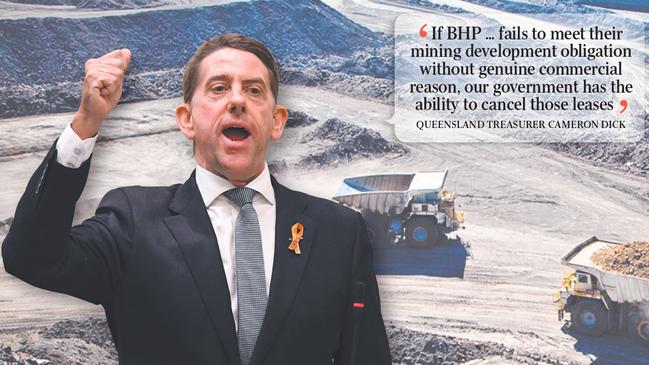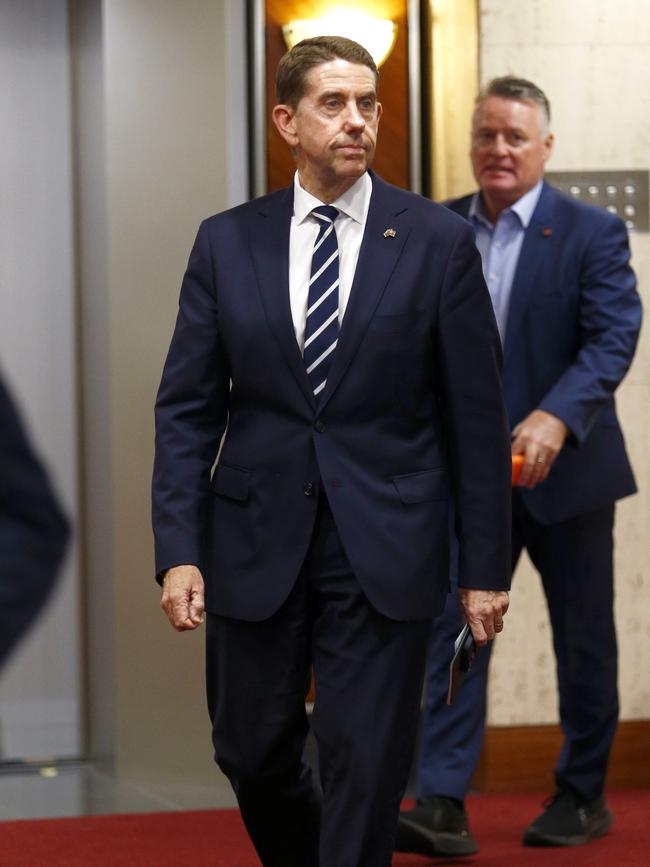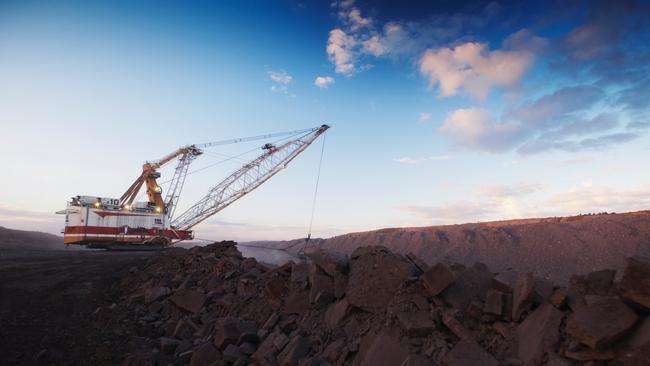Cameron Dick threatens to strip BHP of mining leases
Queensland Treasurer Cameron Dick threatens to strip mining leases if BHP fails to keep investing in the state, in an escalation of the government’s battle with miners.

Queensland Treasurer Cameron Dick has threatened to strip BHP’s mining leases if the Big Australian fails to keep investing in the state, in an extraordinary escalation of the Palaszczuk government’s battle with the mining sector over royalties.
Ahead of the release of BHP’s full-year financial results on Tuesday, Mr Dick warned the government would not hesitate to revoke existing tenures on its seven Queensland mines if they were being “misused”.
BHP and the state’s mining lobby have been at war with the Palaszczuk government for more than a year over Mr Dick’s unheralded coal royalty regime, which was introduced last year despite an election promise of no new or increased taxes.

Queensland’s three-tier coal royalty scheme – which includes the highest mining tax rates in the world – funnelled $15bn into government coffers last financial year and delivered Mr Dick the biggest state budget surplus in history.
The scheme has drawn strong criticism from the resource industry, which claims it has undermined the viability of mines and threatened future investment.
On Monday Mr Dick warned of the government’s “clear expectation” that BHP continue to invest in its current projects.
“BHP has legal obligations, and there are significant consequences for not meeting those obligations,” he told The Australian.
“What I would say, if BHP or any other company fails to meet their mining development obligation without genuine commercial reason, our government has the ability to cancel those leases.”
Mr Dick’s comments come days after the Queensland Resources Council revealed its plans to target key Labor-held seats at next year’s state election.

Under Queensland law, the government can cancel a mining lease if companies do not “prepare, maintain and comply with development plans”.
“We won’t hesitate to act if valuable tenures are being misused, and not being mined when it is clearly commercial to work those tenures,” Mr Dick said. “It’s clear there are plenty of other mining companies who would be willing to take up those leases and invest properly in their development.”
BHP declined to comment. In its latest production report, metallurgical coal-making was in line with the previous year and the company pledged to “sustain and optimise” existing projects.
In the report, released last month, BHP said Queensland’s sovereign risk has increased because of the royalty regime, which has a top tier of 40 per cent for coal prices above $300-a-tonne.
“Given the negative impact this has on investment economics and the increase in sovereign risk, we will not be investing in any further growth in Queensland, however we will sustain and optimise our existing operations,” the report said.
BHP confirmed in February its plans to sell its Daunia and Blackwater mines – part of its BMA group in Queensland – because they would struggle to compete for future capital.
Whitehaven Coal, Peabody Energy, Yancoal, Stanmore Coal and BUMA are circling to buy the two mines, expected to sell for up to $7.5bn.
Mr Dick said interest in BHP’s mines was proof the decision to raise taxes on coalmining companies had not deterred investment in the state.
“I’m sure BHP’s results will show another bumper profit,” he said. “It’s great to see the appetite for new investment in Queensland mining, particularly around Daunia and Blackwater.
“The willingness of serious resource companies to commit to our state shows how strong the sector is, and it exposes the hollowness of the campaign against progressive coal royalties.”
The mining lobby and state government have been locked in a competing multimillion-dollar public relations fight over the royalty scheme.
Mr Dick in June unveiled a $1.5m taxpayer-funded advertising blitz to sell the government’s decision to raise taxes and counter the QRC’s $40m campaign that it plans to run until the October 2024 election.
The state government will use the historic royalty windfall to help bankroll $550 energy rebates for every Queensland household, totally wipe power bills for some pensioners, and make kindergarten free for all families from next year.








To join the conversation, please log in. Don't have an account? Register
Join the conversation, you are commenting as Logout